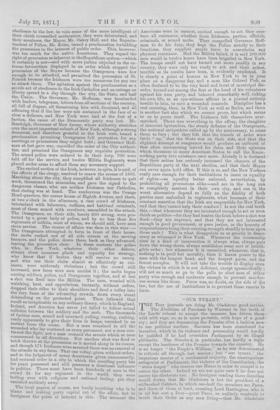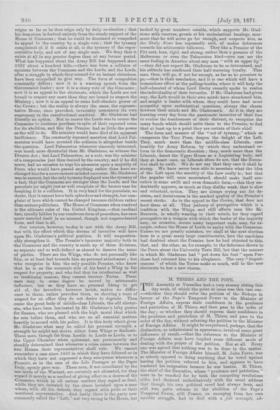"OUR TYRANT."
THE Tory journals are doing Mr. Gladstone good service. The Abolition of Purchase by Warrant in the teeth of the Lords' refusal to accept the measure has driven them wild with rage, or, as is more probable, with hope of a goods cry ; and they are denouncing the Premier after a fashion now. to our political warfare. Sarcasm has been abandoned for - invective, which in its violence and personality would hardly be justified if he had override!). Parliament by an illegal plebiscite. The Standara, in particular, has hardly a topic except the insolence of the Premier towards the country. Ho is no longer "the People's William," as he was denominated in ridicule all through last session ; but "our tyrant," the imperious master of a mechanical majority, the unscrupulous antagonist of Parliament, the violator of the Constitution, the "stern despot" who coerces one House in order to compel it to coerce the other. Indeed we are not quite sure if he does not coerce the electorate too. No foreigner reading these diatribes would dream that Mr. Gladstone is but the president of a stiffneeked Cabinet, in which one-half the members are Peers, and three of them at least, counting Lord Harlington, who is in all but seat a Peer—great Peers, as unlikely wantonly to insult their Order as any men living—that Mr. Gladstone
reigns so far as he does reign only by daily re-election ; that his despotism is derived entirely from the steady support of the House of Commons ; that he could be dismissed or compelled to appeal to the country by a single vote ; that the tyranny complained of, if it exists at all, is the tyranny of the repre- sentative body, and not of any single man. We deny that it -exists at all in any greater degree than at any former period. What has happened about the Army Bill has happened since 1832 about a hundred bills,—there has been a collision of -opinions between the Commons and the Lords, and the Lords, after a struggle in which they seemed for an instant victorious, have been compelled to give way. The form of compulsion oonstantly differs ; now it is a warning speech from the Government leader ; now it is a sharp vote of the Commons ; now it is an appeal to the electorate, which the Lords are not bound to respect any more than they are bound to respect the Ministry ; now it is an appeal to some half-obsolete power of the Crown ; but the reality is always the same, the represen- tative House, once provoked, invariably announces its own supremacy in the constitutional machine. Mr. Gladstone had literally no option. Not to coerce the Lords was to coerce the Commons to continue purchase in spite of their repeated votes for its abolition, and this the Premier had as little the power As the will to do. His ministry would have died of its apparent inefficiency. The constantly repeated assertion that Lord Pal- merston would. have arrested the collision is altogether beside the question. Lord Palmerston whenever sincerely interested, was much more dictatorial than Mr. Gladstone, as witness the Divorce Act ; but Lord Palmerston, as a rule, was the minister of a compromise just then desired by the country, and if he did move, had no occasion to urge his measures upon a majority of Peers, who would have passed anything rather than have ex- oh.anged him for a more earnest-minded successor. Mr. Gladstone was in earnest, but the only tyranny displayed was the tyranny of a fact, that the Commons are stronger than the Lords, and the porcelain jar might just as well complain of the bronze vase for breaking it in a collision. It is very hard for the porcelain, no doubt, that it cannot have both splendour and strength, but com- plaint of laws which cannot be changed becomes children rather than serious politicians. The House of Commons when resolved is the ultimate ruler of the United Kingdom,—that cardinal fact, usually hidden by our cumbrous form of procedure, has once =ore asserted. iteelf in an unusual, though not unprecedented form, and that is all.
Our concern, 'however, to-day is not with the Army Bill, but with the effect which this stream of invective will have upon Mr. Gladstone's political position. It will unquestion- ably strengthen it. The Premier's immense majority both in the Commons and the country is made up of three divisions, so separate and so well-defined as almost to deserve the name Of parties. There are the Whigs, who do not personally like .him, or at least feel towards him no personal attachment ; but 'who recognize in him the only possible Premier, who know that he is on the economic side of his head a Whig in his respect for property, and who feel that for intellectual as well as traditional reasons, they cannot become Tories. These men may in some degree be moved by aristocratic influence, but as they have no personal liking to get rid of, the invective, however lavish, makes no differ- ence to them, rather provokes them, as showing a want of respect for an office they do not desire to degrade. Then -come the great body of middle-class Liberals, the old elector- ate, who have been fascinated by Mr. Gladstone's lofty genius for finance, who are pleased with the high moral ideal which .he sets before them, and who are on all essential matters heartily in accord with his policy. It is this body which gives Mr. Gladstone what may be called his personal strength, a .strength he might not derive either from Whigs or Radicals. These men, though far from hostile to Lords as Lords, or to the Upper Chamber when quiescent, are permanently and steadily determined, that whenever a crisis comes between the t wo Houses their representatives shall rule. We cannot remember a case since 1832 in which they have faltered or in which they have not expressed a deep annoyance whenever a Premier, as in the case of the Life Peerages or the Paper Duty, openly gave way. These men, if not conciliated by the use made of the Warrant, are certainly not alienated, for they regard it merely as a method of giving effect to a decree of the Commons, which in all serious matters they regard as final, while they are irritated by the abuse lavished upon a man whom, with all his defects, they regard with pride as their worthiest representative. And lastly, there is the party now oommonly called the "Left," not very strong in the House, but
backed by great numbers outside, which supports Mr. Glad- stone with reserves, growls at his ecclesiastical leanings, mur- murs that he will never go far enough, and suspects him, as the "Daily NCIOR has repeatedly said, of undue deferences towards his aristocratic followers. They like a Premier of the Pitt sort, lean, rigid, and strong, rather than a premier of the Melbourne or even the Palmerston kind—you can see the same feeling in America about any man with an upper lip" —they did not expect Mr. Gladstone to be so determined, and his attitude has confirmed their half-wavering loyalty. This man, then, will go, if not far enough, as far as he promises to go,—that is their conclusion, and it is one which will have a tremendous effect at the polling-booths, where it will help the half-educated of whom Lord Derby recently spoke to realize the individuality of their favourite. If Mr. Gladstone had given way, the Left would in their own minds have abandoned him, and sought a leader with whom they could have had more sympathy upon ecclesiastical questions, always the chasm between their minds and Mr. Gladstone's, As it is, they are learning every day from the passionate invective of their foes to realize the baselessness of their distrust, to recognize the many bonds which should unite them to the Premier, to feel that at least up to a point they are certain of their chief, The form and manner of the "act of tyranny," which BO exasperate the Tory Press, deepen the delight of the Left. They, much more than the middle-class Liberals, care heartily for Army Reform, by which they understand re- form in the democratic direction ; they, much more than the Liberale, detest the Upper House as a Legislating body, and they at heart care, as Liberals often do not, that the Execu- tive shall be swift. We do not say that they care it shall be strong. We have never been able to ascertain what the idea of the Left upon the sanctity of the Law really is ; but that the popular will, once ascertained, should make itself exe- cutive in some swift and even dramatic form,—this they un- doubtedly approve, as much as they dislike weak, that is slow and reluctant, action. They are always crying out for de- cision, and decisiveness is the marked quality of the Premier's recent stroke. As to the appeal to the Crown, that does not hurt them at all. That jealousy of prerogative which is a tradition with the Whigs, and still affects men like Mr. Bouverie, is wholly wanting to their minds, for they regard prerogative as a weapon with which the leader of the majority may, on occasion, secure many important ends, may, for ex- ample, reduce the House of Lords to amity with the Commons. Unless we are greatly mistaken, we shall at the neat election hear in a great many large constituencies, how the candidate had doubted about the Premier, how he had objected to this, that, and the other, as, for example, to the deference shown to the Peers about the University Tests Bill, but that the manner in which Mr. Gladstone had " put down his foot" upon Pur- chase had rebound him to his allegiance. The very "imperi- ousness " of which the Tories make so much, will to the new electorate be but a new charm.

































 Previous page
Previous page